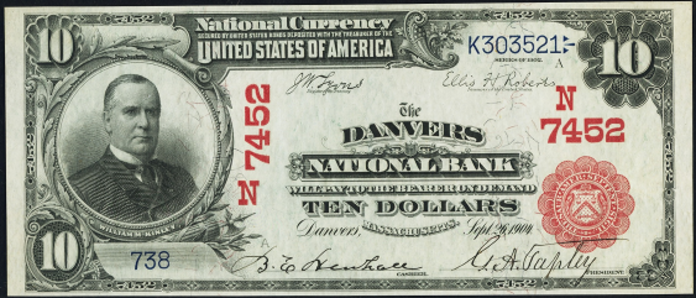Ten Dollar Notes › Nationals › 1902 Ten Dollar National Bank Notes › Indiana Charters › 1902 $10 Wabash Indiana First National Bank
Get Value Now
| Item | Info |
|---|---|
| Series | 1902 |
| Charter | #129 First National Bank of Wabash, Indiana |
| Year Chartered | 1863, 179 Banks Chartered |
| City Info | Wabash is a city in Noble Township, Wabash County, in the U.S. state of Indiana. The population was 10,666 at the 2010 census. The city is the county seat of Wabash County. Wabash is notable as claiming to be the first electrically lighted city in the world, which was inaugurated on March 31, 1880. However, closer inspection of the reference shows only the court house grounds were lighted. It is also home to the historic Eagles Theater, Paradise Spring Treaty Grounds, the Wabash and Erie Canal, Presbyterian Church, and Disciples of Christ Christian Church. A seasonal classic root-beer stand sits atop the man made geographic cut directly south of the Wabash river, and attracts locals to its traditional car-side service. Source: Wikipedia |
| Similar Cities | If your note doesn't match try: 1. Wabasha, Minnesota - First National Bank 2. Wabash, Indiana - Wabash National Bank 3. Wabash, Indiana - Farmers and Merchants National Bank |
| Seal Varieties | Red, Blue |
| See Also | If your note doesn't match try: 1. 1907 $10 Gold Certificate 2. 1901 $10 Legal Tender 3. 1908 $10 Silver Certificates |
| Other Info | 1. Value depends on notes known for charter, condition and market demand. |
| Neat Fact | Plain Backs issued in sheets of 4 Notes: 3 $10 Notes, 1 $20 Note. Less commonly 4 $20 Notes (Friedbergs, 20th Ed. P131) |
No Obligations Offers and Appraisals
Please submit a good photo or scan. It will be identified and evaluated. Understand there may be subtle differences between the image you see above and your note. Signatures, design, markings and note condition will determine the offer price. Notes in Uncirculated or better condition receive the best offers.
Appraisals can be estimated for wholesale and retail prices. Wholesale is what dealers typically pay. Retail is what a collector might pay. Retail is slightly higher in most cases.
Please visit this page for USA Paper Money Reference. Do not treat this page as a reference guide, it is for appraisal and acquisition purposes only.
